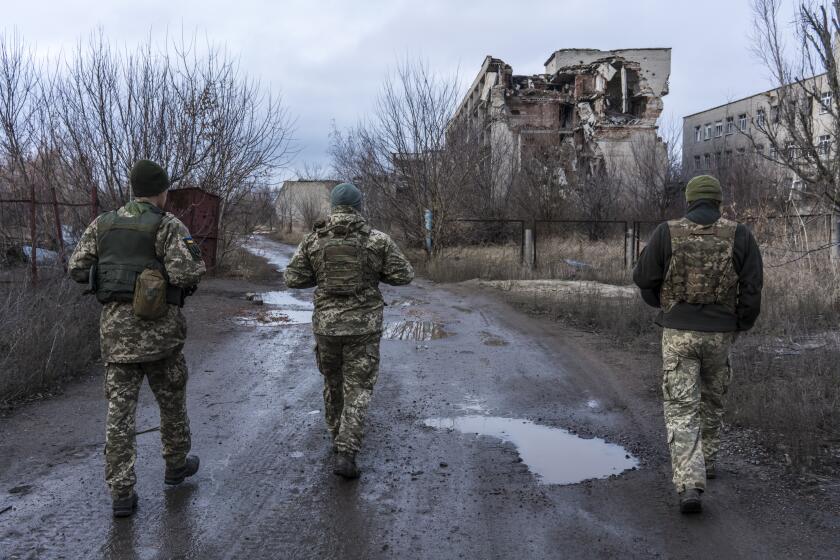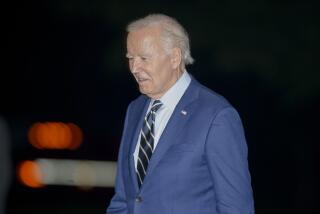Biden, Putin to talk as tensions rise over military buildup near Ukraine

U.S. and Western allies have watched the buildup of Russian troops near the border of Ukraine, fueling fears that Moscow is preparing to invade.
WASHINGTON â President Biden and Vladimir Putin will speak by phone Thursday at the Russian leaderâs request in hopes of finding a diplomatic offramp to the volatility surrounding Russiaâs military buildup at its border with Ukraine.
The call, confirmed by the White House on Wednesday, will mark the second direct leader-to-leader talks this month. Despite Bidenâs clear warning in a Dec. 7 video call that an invasion would be met with severe economic sanctions by the U.S. and NATO allies, Putin has maintained the heavy troop presence along the Ukrainian border.
âWe are at a moment of crisis and have been for some weeks now, given the Russian buildup, and it will take a high level of engagement to try to address this and find a path to de-escalation,â a senior administration official, speaking on the condition of anonymity, told reporters Wednesday.
An estimated 100,000 Russian troops at the border are fueling concerns across the region about an invasion and potential war that could jeopardize Ukraineâs security and draw a host of allies into a military conflict.
âWe continue to be gravely concerned about the nature of the Russian troop presence there and the capabilities that they have,â the official said.
Biden, they added, planned to reiterate to Putin that a troop drawdown is the main condition âfor there to be real progress in these talks.â
Putin, however, continues to push for security guarantees in Eastern Europe and said earlier this week he would ponder retaliatory options of his own if the West stops short of guaranteeing that Ukraine will not be admitted into NATO.
Biden and other NATO members have refused to go that far, and are unlikely to say explicitly that Ukraine will never join the long-standing transatlantic alliance that, under its Article V, recognizes an attack on any member nation as an attack against all. Although Washington continues to provide Ukraine with millions in defense aid, the administration, along with many European allies, is wary of fully guaranteeing the countryâs future military defense â a reality not lost on Putin as he seeks to press his leverage.
The administration official also said they did not know why, specifically, Putin was requesting a second call with Biden, but that the president was eager to engage and would continue to push for a diplomatic solution while staying in close contact with allies.
The call will come ahead of planned U.S.-Russia talks between officials on Jan. 10 in Geneva, a meeting that is unlikely to include Biden or Putin themselves, the official said. Meetings between NATO and Russia, as well as the Organization for Security and Cooperation in Europe, where Ukraine will be present, will take place at the same time, the official said.
The U.S. has been coordinating with allies to bring sanctions well beyond those imposed in 2014 over Russiaâs invasion and annexation of the Crimean peninsula and its backing of separatist fighters in eastern Ukraine, the official said.
While Russian state media seek to whip up anti-Western sentiment, the Russian public isnât spoiling for a fight.
Ahead of Thursdayâs call, Secretary of State Antony J. Blinken spoke Wednesday with Ukraineâs president.
Blinken reiterated to President Volodymyr Zelensky âthe United Statesâ unwavering support for Ukraineâs independence, sovereignty, and territorial integrity in the face of Russiaâs military buildup on Ukraineâs borders,â according to State Department spokesman Ned Price. They discussed peacefully resolving the conflict, Price said.
Moscow this month submitted draft security documents demanding that NATO deny membership to Ukraine and other former Soviet countries and roll back its military deployments in Central and Eastern Europe.
The Associated Press contributed to this report.
More to Read
Sign up for Essential California
The most important California stories and recommendations in your inbox every morning.
You may occasionally receive promotional content from the Los Angeles Times.












